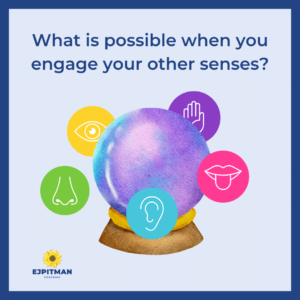Last weekend, I cuddled under a blanket in my chair and turned on Miss Marple. It has been at least six months since I watched her and my plan was to enjoy a cozy rest with my friend Marple in the background. I wasn’t going to miss anything coming in and out of sleep, since this was likely my 23rd viewing.
I pushed play, snuggled in, and closed my eyes.
When was the last time you watched a show with your eyes closed? Or when was the last time you watched a movie with the sound on mute – just reading the captions?
Cinema music is a place where art and scientific precision meet. I take the soundtrack of most of what I watch (and live) for granted. But when I become aware of it – when I see the movie with my ears given more focus than my eyes – I marvel. As I invited myself to rest with Miss Marple in the background, I was surprised to hear how much music there was. The scenes aren’t just stitched together with the music, they are woven. There are long stretches of no dialog and it was an utterly lovely sleepy soundtrack.
How does our visibility experience change when we allow other senses their contribution?
Driving using the sense of smell you can tell if your brakes are healthy or if that undefinable mass ahead is squirrel or skunk.
Touch is often used to connect and stabilize. As your eyes adjust in a dark room, you run your hand across the wall hoping to not stub your toe.
How is taste a visibility tool? As a picky (I’m growing!) eater, I anticipate taste and often won’t take a bite because I have already decided the taste isn’t worth the risk of unpleasantness.

Five questions that support visibility:
With eyes open what do I see? What do I become aware of when I close my eyes?
When I tune in primarily with my ears, what do I hear? What happens when I cover my ears?
What does this feel like – sketching out this plan with a pen versus drawing it out with a crayon?
How does this ‘smell’ inform my choices to move forward or move around?
What am I missing if I evaluate this based only on sight and smell… what ‘taste’ could be here that I don’t expect? (And is it important enough to take a tiny bite risk?)
Some of these questions force a stretch into your imagination. You can do it. When we shift our visibility through our senses either through heightened awareness or deprivation, our vision shifts. What is possible takes on different shadows and importance?
You don’t want to engage this sensory scan for every decision you are facing. But when you feel stuck – especially with a plan or idea that does not feel ‘right’ – shake things up. Invite the team of your senses (and imagination). What becomes available to you when you change your visibility experience?